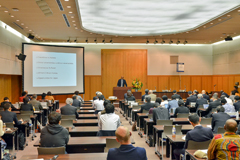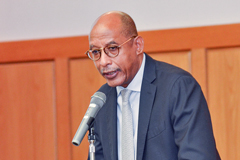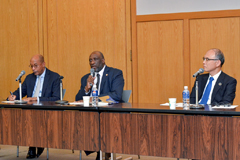Critical Choices for Africa’s Future: A Discussion With AUDA-NEPAD CEO Mayaki
2019.11.29
Japan International Cooperation Agency (JICA) welcomed Ibrahim Mayaki, CEO of African Union Development Agency-New Partnership for Africa's Development (AUDA-NEPAD), to the JICA Ichigaya Building on Nov. 7, 2019, for a public seminar entitled "'Africa's Critical Choices: A call for a Pan-Africa roadmap' and Opportunities for Japan."
Beginning in 1996, Mayaki served first as foreign minister and then as prime minister of Niger, and in 2008 he became the CEO of NEPAD. On the day of the seminar, he received the Grand Cordon of the Order of the Rising Sun for his long contribution to strengthening the relationship between Japan and Niger and between Japan and the African Union.

The seminar brought together about 100 people
"I trust that Mayaki's lecture today will be valuable for all of us to understand the future direction of Africa’s development and his expectation on the role of Japan, both public and private sectors," said JICA Research Institute (JICA-RI) Director Izumi Ohno, who gave opening remarks.
Next, Mayaki gave a keynote address on Africa's future development strategy based on his new book "Africa's Critical Choices: A call for a Pan-Africa roadmap." He said Africa is at a major turning point as it continues to build up its own expertise, and the book presents a roadmap for Africa's development strategy.
One of the points he raised was "Transitions vs. Policies." He touched on demographic movements that will require the creation of 20 million jobs per year for the next 20 years; communication mechanisms based on the spread of mobile phones; natural resource management, which will be affected by climate change; urbanization in which there is no longer any clear boundary between urban and rural; and changes in the industrial structure due to the rise of the informal sector. The lack of capacity of policymakers will be an issue in responding to these changes, and we need to combine a bottom-up approach with the traditional top-down one, he added.

Ibrahim Mayaki, CEO of AUDA-NEPAD gave a keynote address
Regarding "Global uncertainties vs. African uncertainties," he pointed out the need to newly strengthen multilateralism for climate change measures, conflict resolution and free trade, and regarding "Governance vs. power," he pointed out that in Africa, where young people are the majority, the concept of power has changed with advances in technology and it's necessary to involve young people in the political process through technology.
Based on the above points, he raised the topic of "Africa's Critical Choices." These include having various actors’ points of view to cooperatively formulate policies; utilizing domestic resources by transferring knowledge through private investment rather than being dependent on ODA; and promoting development from the regional perspective, for example, economic corridors that span multiple African countries, rather than from the perspective of individual countries.
Finally, he talked about "Opportunities for Japan." He summarized this topic by saying that Japanese companies' investments in Africa have doubled between 2012 and 2018. While issues remain with regard to logistics in the Africa region, the business environment has improved and Africa remains a frontier for Japanese and other foreign private companies.
Next, two commentators held a discussion.
Dean Oussouby Sacko of Kyoto Seika University, who is Malian and is Japan's first university president from Africa, pointed out the importance of educating African young people. Mayaki agreed and said that if African young people are able to access global information, they will be able to have their own opinions and perform analysis, adding that that's what is known as an independent citizen and it's the foundation of true democracy.
Chairman Yasuhiko Yokoi of the Africa-Japan Relations Committee of the Japan Association of Corporate Executives (Keizai Doyukai) touched on the establishment of the African Continental Free Trade Area (AfCFTA) and expressed his expectations for the expansion of Japanese companies into Africa. In response, Mayaki discussed the current state of the business environment in Africa, bringing up issues related to hard infrastructure such as physical infrastructure and those related to soft infrastructure such as improving the capacity of customs officials.

Dean Oussouby Sacko of Kyoto Seika University (center) and Chairman Yasuhiko Yokoi of the Africa-Japan Relations Committee of the Japan Association of Corporate Executives (right) held a discussion
After that, many audience members asked questions and a lively discussion took place.

事業事前評価表(地球規模課題対応国際科学技術協力(SATREPS)).国際協力機構 地球環境部 . 防災第一チーム. 1.案件名.国 名: フィリピン共和国.

事業事前評価表(地球規模課題対応国際科学技術協力(SATREPS)).国際協力機構 地球環境部 . 防災第一チーム. 1.案件名.国 名: フィリピン共和国.

事業事前評価表(地球規模課題対応国際科学技術協力(SATREPS)).国際協力機構 地球環境部 . 防災第一チーム. 1.案件名.国 名: フィリピン共和国.

事業事前評価表(地球規模課題対応国際科学技術協力(SATREPS)).国際協力機構 地球環境部 . 防災第一チーム. 1.案件名.国 名: フィリピン共和国.

事業事前評価表(地球規模課題対応国際科学技術協力(SATREPS)).国際協力機構 地球環境部 . 防災第一チーム. 1.案件名.国 名: フィリピン共和国.
scroll